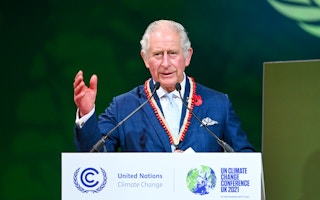Britain’s King Charles urged world leaders at the COP 28 UN climate summit in Dubai on Friday to move towards “genuinely transformational action” on global warming and achieve a turning point like the 2015 Paris Agreement.
Speaking to delegates from nearly 200 countries, he warned “alarming tipping points” were being reached with climate change and said the world must “rapidly repair and restore” nature.
“It worries me greatly that we remain so dreadfully far off track,” Charles said.
Here’s a look at his track record on green issues:
Why is Charles attending COP28?
Charles has been a high-profile climate campaigner for decades. When he became king last year, analysts said he was expected to be politically neutral, potentially limiting his green activism.
The speech in Dubai is his third at the annual climate summits, but his first as monarch.
He also spoke at COP26 in Glasgow and COP21 in Paris - when a landmark deal was struck to limit global average temperature rise to “well below” 2 degrees Celsius (3.6 Fahrenheit) and ideally 1.5°C (2.7°F).
“I’ve spent a large proportion of my life trying to warn of the existential threats facing us over global warming,” Charles said in Dubai.
“
He’s been talking about these issues for a long time, way before they became mainstream. To make sure we go for really ambitious climate action in the UK, we need the conservative case for climate change to be made.
Ed Matthew, campaigns director, E3G
About 130 leaders are attending the talks in the United Arab Emirates this week, including British Prime Minister Rishi Sunak and Brazilian President Luiz Inácio Lula da Silva, but US President Joe Biden and Chinese President Xi Jinping will not be there.
What has Charles done for the environment?
While heir to the throne, Charles was an active campaigner for the environment for more than five decades.
In 1970, aged 21, he gave his first major speech on the issue, warning of the dangerous effects of plastic pollution.
“He’s been talking about these issues for a long time, way before they became mainstream,” Ed Matthew, campaigns director of think-tank E3G, told Context.
Charles has called for governments to use incentives and regulation to encourage private-sector investment in climate action, and for the value of nature to be recognised on companies’ balance sheets.
Along with speeches on the global stage, Charles has worked with the public, private and non-profit sectors.
He established the International Sustainability Unit in 2010 to address challenges such as protecting rainforests and marine ecosystems, and in 2021 launched a new charter of sustainable actions for companies to sign up to called “Terra Carta”.
Matthew said Charles’ influence has been particularly valuable because - while being apolitical - he appeals to conservatives, in a similar vein to environmentalist David Attenborough, on an issue more often highlighted by the left.
“To make sure we go for really ambitious climate action in the UK, we need the conservative case for climate change to be made,” Matthew said.
What are Charles’ views on climate change?
Environmental campaigner Tony Juniper first met Charles in the early 1990s and has worked with him on projects including the 2010 book “Harmony: A New Way of Looking at Our World”.
“I think he probably has been about the most effective environmentalist in history,” said Juniper, who chairs Natural England, the government’s advisory body for the environment.
Charles has successfully promoted the interconnection between humans and nature, he added.
“One of the most important unique contributions that he’s brought is this holistic perspective,” he said.
In an interview in December 2020, Charles said humans are “a microcosm of the macrocosm” when it comes to nature.
“If we go on exploiting the way we are, whatever we do to nature - however much we pollute her - we do to ourselves. It is insanity,” he told the BBC.
However, Charles has been accused of hypocrisy due to his use of private jets and helicopters, whose planet-heating emissions are much higher than other forms of transport and significantly more per passenger than commercial flights.
He again used a private jet to attend the COP28 summit.
During the 2021-22 financial year as Prince of Wales, he took regular private flights domestically, as shown by royal financial statements.
Can Charles advocate for the climate as monarch?
While Queen Elizabeth II strictly guarded her personal views and was widely regarded as untouchable by the media, Charles has faced criticism for expressing political opinions.
Richard Black, a former BBC environment correspondent and founder of the non-profit Energy and Climate Intelligence Unit, said Charles would be restricted by two main things: the pressures on his time due to the ceremonial duties of a king, and the likely scrutiny of his political neutrality.
This will make more hands-on work with businesses and in politics harder, he said.
As king, Charles could have a major influence - whether through speeches and behind-the-scenes meetings with world leaders, or private audiences with British prime minister.
On a personal level, he could lead by example, such as with his efforts to make the royal household greener.
Charles has been tracking and publishing his carbon footprint since 2007, making changes such as installing biomass boilers and solar panels at his homes and converting his Aston Martin sports car to run on surplus wine and whey from cheese-making.
And to help avoid controversy, Charles could pass some projects on to family members, with his son Prince William also expressing a keen interest in environmental issues.
How to execute the role of monarch is up to the individual, said environmental campaigner Juniper.
“As far as I know, there is no job description for king.”
This story was published with permission from Thomson Reuters Foundation, the charitable arm of Thomson Reuters, that covers humanitarian news, climate change, resilience, women’s rights, trafficking and property rights. Visit https://www.context.news/.

















